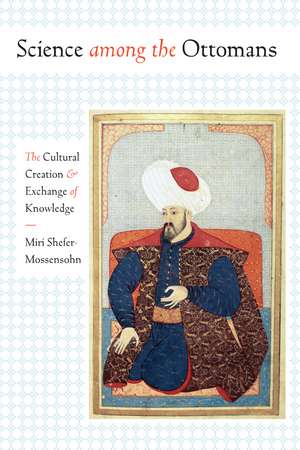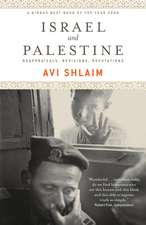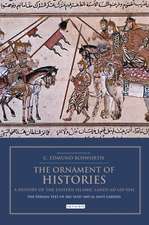Science among the Ottomans: The Cultural Creation and Exchange of Knowledge
Autor Miri Shefer-Mossensohnen Limba Engleză Paperback – 15 oct 2015
In the first book on this topic in English in over sixty years, Miri Shefer-Mossensohn contends that Ottoman society and culture created a fertile environment that fostered diverse scientific activity. She demonstrates that the Ottomans excelled in adapting the inventions of others to their own needs and improving them. For example, in 1877, the Ottoman Empire boasted the seventh-longest electric telegraph system in the world; indeed, the Ottomans were among the era’s most advanced nations with regard to modern communication infrastructure. To substantiate her claims about science in the empire, Shefer-Mossensohn studies patterns of learning; state involvement in technological activities; and Turkish- and Arabic-speaking Ottomans who produced, consumed, and altered scientific practices. The results reveal Ottoman participation in science to have been a dynamic force that helped sustain the six-hundred-year empire.
Preț: 167.58 lei
Nou
Puncte Express: 251
Preț estimativ în valută:
32.07€ • 33.56$ • 26.69£
32.07€ • 33.56$ • 26.69£
Carte disponibilă
Livrare economică 10-24 martie
Livrare express 22-28 februarie pentru 28.68 lei
Preluare comenzi: 021 569.72.76
Specificații
ISBN-13: 9781477312216
ISBN-10: 1477312218
Pagini: 262
Dimensiuni: 152 x 229 x 18 mm
Greutate: 0.45 kg
Editura: University of Texas Press
Colecția University of Texas Press
ISBN-10: 1477312218
Pagini: 262
Dimensiuni: 152 x 229 x 18 mm
Greutate: 0.45 kg
Editura: University of Texas Press
Colecția University of Texas Press
Notă biografică
MIRI SHEFER-MOSSENSOHN is an associate professor of Middle Eastern and African History at Tel Aviv University. She is an Ottomanist, working on both the Arabic- and Turkish-speaking domains of the empire. Her interests lie with medicine and science as a social encounter between scholars and laypersons, patrons and clients, readers and artisans, and the state apparatus and the individual.
Cuprins
- Preface
- A Note on Transliteration
- Introduction: What Is the History of Science?
- The History of Science and Technology
- The History of Islamic Science and Technology
- The History of Ottoman Science and Technology History
- Toward a History of Ottoman Scientific Experiences
- On Inventiveness: An Ottoman Lesson
- Chapter 1. Framing “Knowledge” in the Ottoman Empire
- A Eurasian Matrix: The Multiple Cultural Sources of Knowledge in the Ottoman Empire
- The Ottoman Concept and Epistemology of Knowledge: The Term cIlm
- Classification of Knowledge in Muslim Societies
- Amalgamation of Bodies of Knowledge in Muslim Societies
- Tensions due to Fusion of Bodies of Knowledge: The Dispute regarding the Status of Pre-Islamic Sciences
- Mediating Mechanisms of Reception
- Chapter 2. Where and How Does Learning Take Place?
- Pedagogy
- New Educational Institutions and a New Type of Education in the Long Nineteenth Century
- Chapter 3. Transfer of Knowledge to, from, and within the Ottoman Empire
- Ottoman Literacy
- Translations and Translators among the Ottoman Elite
- Marginal Groups as Agents of Knowledge
- The Passage of Travelers and Knowledge to and from the Empire
- Chapter 4. State in Science: On Empire, Power, Infrastructures, and Finance
- The Patron and the Scholar: Intisap and Waqf/Vakıf
- Science and Technology and the Ottoman State Infrastructure
- Science, State, and the State above It: The (Semi)Colonial Connection
- Conclusion: Ottoman Science
- A Teacher and a Student: Murtaḍá al-Zabīdī and cAbd al-Raḥmān al-Jabartī as Ottoman Scientists
- Ottoman Patterns of Scientific Activity
- Ottoman Innovation
- Notes
- Bibliography
- Index
Recenzii
"Timely...Shefer-Mossensohn consistently avoids the emphasis on technical development that long characterized the literature on science in Islamic contexts, limiting its readership to specialists...Science among the Ottomans opens an important conversation."
"By offering us a new synthesis that represents the current state of the field, Shefer-Mossensohn’s book addresses the perennial question of what happened to Islamic science and medicine after the Middle Ages. It offers a starting point for further discussions."
"Science among the Ottomans is a remarkable achievement…Shefer-Mossensohn has produced a landmark study with which many of us will train the next generation of historians of science."
Descriere
The first book on the topic in English in over sixty years, Science among the Ottomans contends that, contrary to the generally accepted belief that the Ottomans lost interest in science, science was a valued, dynamic, and sustaining force throughout the















